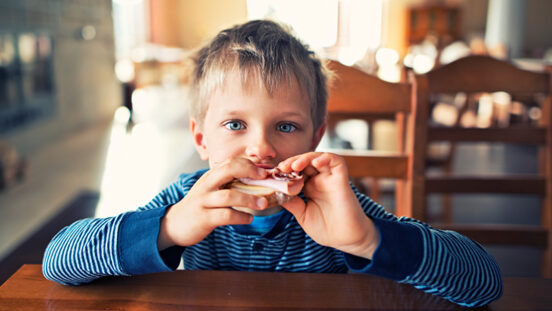Why is the humble ham sandwich getting such a bad rap and should we stop sending them to school?

Say goodbye to the classic ham sandwich? The beloved ham and cheese toastie is becoming a thing of the past in some schools, as one Aussie state adds ham to the banned list.
In 2023, a controversial leaflet from the Cancer Council was sent out by teachers at NSW schools advising kids to stop eating their favourite ham sandwiches because of the link between processed meats and the risk of cancer.
Last year, Western Australia took that one step further by banning ham at school altogether after an overhaul of the western state’s school food and drink rules came into effect. Under the new rules, ham is now considered ‘red’ in the traffic light classification of school canteen items, effectively banishing it from canteen menus altogether.
The advice has seen a furious backlash, not only from parents who say they are sick of the “nanny state” policing their children’s lunches, but has seen pork producers and butchers defending the humble ham sanga and insisting that the messaging in the healthy eating leaflets is an overreaction.
Today host, Karl Stefanovic has previously fired up on air, hitting out at the “woke brigade” and calling the move to limit ham “un-Australian”.
Why ban the ham sandwich?
A spokeswoman for the NSW Department of Education spoke to The Daily Telegraph and confirmed that the Cancer Council note was a recommendation only.
“For many students, no lunch box is complete without a ham sandwich. No public school has banned these,” they said.
According to the Cancer Council’s Healthy Lunchbox page, their recommendation to reduce your cancer risk is to “make processed meat an occasional food only and not a regular choice”.
Their recommendation to limit or avoid processed meats is because of their link with increasing the risk of bowel and stomach cancer. Bowel cancer is one of the most common cancers in Australia.
Processed meats include ham, devon, bacon, salami, frankfurts, prosciutto and some sausages such as cabanossi and kransky.
Their suggestion is to replace those products with sandwich fillers such as:
- BBQ chicken with skin removed
- Canned tuna or salmon
- Boiled eggs
- Hummus
- Cheese
- Leftover home-cooked meat such as slices of roast
- Home-cooked rissoles

Why ham may be unhealthy
High in sodium: Ham is often cured or processed with salt, making it high in sodium. Excess sodium can increase the risk of high blood pressure and heart disease.
Processed meat voncerns: Many types of ham are classified as processed meats, which have been linked to a higher risk of certain diseases, including colorectal cancer, when eaten in large amounts.
Added nitrates: Some hams contain preservatives like nitrates or nitrites, which can form harmful compounds when cooked at high temperatures.
High in fat: Certain cuts of ham can be fatty, which may not be ideal for people watching their saturated fat intake.
Even politicians are weighing in on the debate
NSW Transport Minister David Elliott agreed with Karl Stefanovic’s thoughts on the messaging being too politically correct.
Speaking to 2GB’s Ben Fordham, Mr Elliot said: “It is a daily battle with people who just want to get into our lives, influence our opinions and tell us what we’re doing wrong. I’m a big fan of the Cancer Council … but you’re not doing yourselves any favours when you’re trying to tell families exactly what they can and cannot eat.”
Also coming out to defend the salty, pink delicacy, was David Bligh, the owner of Bringelly Pork and Bacon. Speaking with The Daily Telegraph on Tuesday, he said: “Ham is actually a product which has been developed over the last 5000 years and people have eaten it through the ages without any problems.”

There is a bigger issue with school lunches right now
Research from Deakin University has found that most primary school students are being given just 10 minutes to eat lunch, even though many parents and teachers agree this is not enough time for children to finish eating the food in their lunchbox.
The study found that parents believed children needed at least 15 minutes to finish their lunch before being allowed to go out to play.
Dr Claire Margerison from IPAN and Dr Melissa Burton from SENS said their research, recently published in Appetite, revealed that when children were given more time, parents reported they were more likely to finish what was in their lunch box.
“Our research found that some parents also believe that limiting eating times influences the types of food their children wanted to take for lunch,” Dr Burton said.
“For example, with less time to eat, children are more likely to prioritise the most appealing foods in their lunch box, such as the treats, which are often nutrient poor.
“These findings not only have implications for children’s health but also their ability to learn as research tells us that good nutrition is necessary to help children thrive academically,” Dr Burton said.




